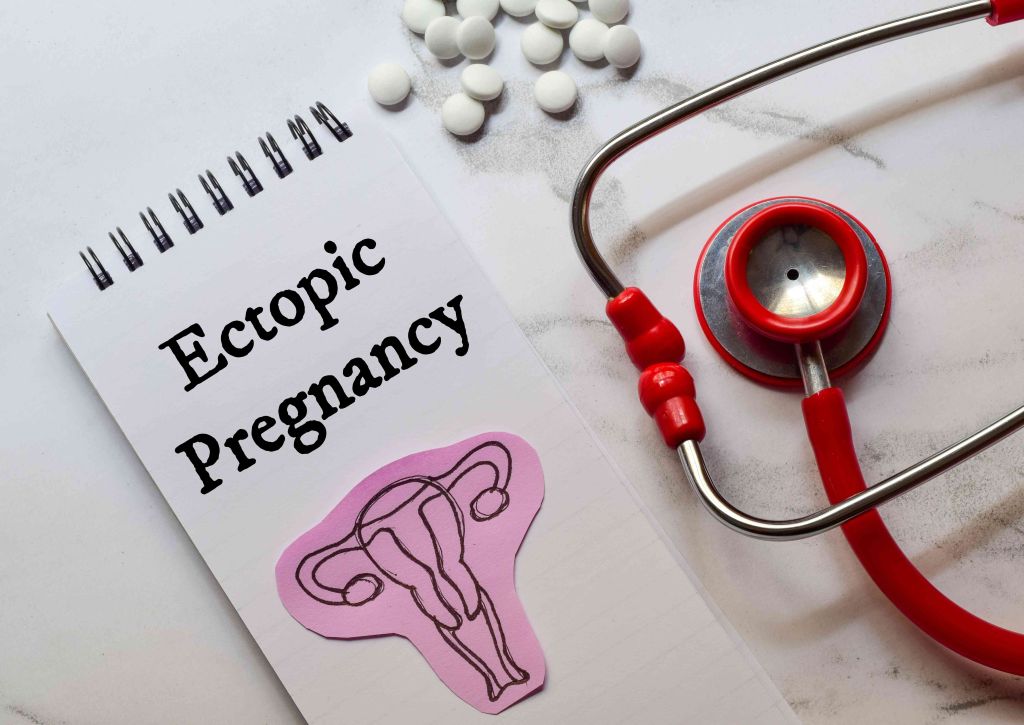Written By: Dr. Oksana Melnyk
Dr. Oksana Melnyk is a specialist in the Obstetrics & Gynaecology at Medcare Women & Children Hospital. She completed her Specialist Diploma in Medicine from the Bogomolets National Medical University, Kyiv, Ukraine and a postgraduate Specialist Training in Obstetrics and Gynaecology as well as a PhD in Medicine, Obstetrics and Gynaecology from the Shupyk National Healthcare University of Ukraine.
Updated On:January 28, 2025
Read more.

What is Ectopic Pregnancy?
Fertilized eggs are the first step in pregnancy. The fertilized egg normally attaches to the uterine lining. An ectopic pregnancy happens when a fertilized egg implants and grows outside the uterus's main cavity. A pregnancy that is ectopic cannot develop properly. If left untreated, the fertilized egg cannot survive, and the expanding tissue may result in life-threatening hemorrhage.
Causes of Ectopic Pregnancy
Ectopic pregnancy is typically brought on by disorders that hinder or inhibit the migration of the egg via your fallopian tube. This is conceivable because of the following reasons:
- You have adhesions, inflammation, or scar tissue from a previous pelvic operation.
- Your fallopian tubes have been harmed, perhaps as a result of a sexually transmitted infection.
- Your fallopian tube was misaligned from birth.
- Your fallopian tube is blocked by a growth.
Signs & Symptoms of Ectopic Pregnancy
Early signs and symptoms of an ectopic pregnancy can resemble usual pregnancy symptoms quite closely. However, you can also encounter the following symptoms of an ectopic pregnancy:
- Vaginal bleed
- Discomfort in your pelvis, lower back, and lower abdomen
- Weakness or vertigo
The pain and bleeding that result from a fallopian tube rupture may be so bad that they contribute to other symptoms. They may consist of the following:
- Fainting.
- Reduced blood pressure (hypotension)
- Shoulder pain
- Bowel discomfort or rectal pressure
You can experience a sudden, severe lower abdomen pain if a tube rupture. A medical emergency has occurred. You need to visit the emergency department right away or call your doctor.
When to see a doctor for Ectopic Pregnancy?
Seek immediate help, if you experience any of the warning signs or symptoms of an ectopic pregnancy, such as:
- severe pelvic or abdominal discomfort coupled with vaginal bleeding
- excessive dizziness or fainting
- shoulder pain
Ectopic Pregnancy Risk Factors
Your chances of getting an ectopic pregnancy may rise due to a number of risk factors. You might be more likely to experience an ectopic pregnancy if you've had
- an ectopic pregnancy in the past,
- a history of pelvic inflammatory disease (PID), an infection that can lead to the formation of scar tissue in your cervix, uterus, and fallopian tubes,
- surgery on your pelvic organs or on your fallopian tubes, including tubal ligation,
- a history of infertility,
- in vitro fertilization is used to treat infertility (IVF),
- endometriosis,
- sexually transmitted infections,
- an IUD in place during conception,
- and if you are a smoker.
Contact your healthcare practitioner as soon as possible if you become pregnant, have an intrauterine device (IUD) in place, or have had your tubes tied in the past. Ectopic pregnancies are more frequent in these circumstances. With age, your risk may also rise. The risk is larger for those over 35 than for those under 35.
Ectopic Pregnancy Complications
As the fetus develops, it may stretch and enlarge. The fallopian tubes in your body are not as flexible. As the fertilized egg grows, they may burst. If it does, significant, potentially fatal internal bleeding may result. To prevent damage to your fallopian tube and other organs, internal bleeding, and perhaps death, an ectopic pregnancy needs to be treated straight away.
Ectopic Pregnancy Diagnosis
Your doctor can find regions of pain, sensitivity, or a lump in the ovary or fallopian tube by performing a pelvic exam. But, a physical examination by your doctor cannot reveal an ectopic pregnancy. Blood tests and an ultrasound are required.
To determine whether you are pregnant, your doctor will request a blood test for human chorionic gonadotropin (HCG). This hormone's levels rise during pregnancy. Unless ultrasound testing can confirm or rule out an ectopic pregnancy, which is typically about five to six weeks following conception, this blood test may be repeated every few days.
With the aid of a transvaginal ultrasound, your doctor can pinpoint the precise placement of your pregnancy. A wand-like instrument is inserted into your vagina to conduct this test. It generates images of your uterus, ovaries, and fallopian tubes using sound waves and transmits those images to a nearby monitor.
Also, your doctor might choose to go with an abdominal ultrasound. An ultrasound wand is moved over your tummy during an abdominal ultrasound, which can be used to check for internal bleeding or confirm your pregnancy.
Ectopic Pregnancy Treatment
Outside of the uterus, a fertilized egg cannot develop normally. The ectopic tissue must be removed to avoid potentially fatal complications. This may be accomplished through medication, laparoscopic surgery, or abdominal surgery, depending on your symptoms and the time the ectopic pregnancy is identified.
Medication
The most popular kind of treatment for an early ectopic pregnancy without unstable bleeding is methotrexate, a drug that inhibits cell division and dissolves existing cells. The drug is administered through injection. Before beginning this treatment, it is crucial that the diagnosis of ectopic pregnancy be certain.
Your doctor will arrange a second HCG test after the injection to assess how well the treatment is working and whether you require further medication.
Laparoscopic Surgery
Two laparoscopic procedures, salpingostomy and salpingectomy, are used to treat some ectopic pregnancies. A small incision is created in the abdomen during these procedures, either near or in the navel. The tubal area is then viewed by your doctor using a narrow tube called a laparoscope that is fitted with a camera lens and light.
A salpingostomy involves removing the ectopic pregnancy and allowing the tube to heal naturally. The ectopic pregnancy and the tube are both removed during a salpingectomy.
Abdominal Surgery
You may require urgent surgery if the ectopic pregnancy is resulting in significant bleeding. The procedure can be carried either laparoscopically or via an abdominal incision (laparotomy). The fallopian tube may be saved in specific circumstances. A ruptured tube must typically be removed, though.
Ectopic Pregnancy Prevention
Ectopic pregnancy is unavoidable. By adopting a healthy lifestyle, you can try to lower your risk. They include giving up smoking, achieving and maintaining a healthy weight, and making sure you have not contracted any sexually transmitted infection. Before attempting pregnancy, discuss any risk factors you may have with your healthcare professional.
References
Dialani, V., & Levine, D. (2004). Ectopic pregnancy: A review. Ultrasound Quarterly, 20(3), 105-117.
Lozeau, A. M., & Potter, B. (2005). Diagnosis and management of ectopic pregnancy. American family physician, 72(9), 1707-1714.
Murray, H., Baakdah, H., Bardell, T., & Tulandi, T. (2005). Diagnosis and treatment of ectopic pregnancy. Cmaj, 173(8), 905-912.
Sivalingam, V. N., Duncan, W. C., Kirk, E., Shephard, L. A., & Horne, A. W. (2011). Diagnosis and management of ectopic pregnancy. Journal of Family Planning and Reproductive Health Care, 37(4), 231-240.
Tulandi, T., & Saleh, A. (1999). Surgical management of ectopic pregnancy. Clinical obstetrics and gynecology, 42(1), 31-38.
Meet our doctors from the Obstetrics & Gynaecology department
|
||||||||
|
||||||||
|
||||||||
|
||||||||
|
||||||||
|
||||||||
|
||||||||
|
||||||||
|
||||||||
|
||||||||
|
||||||||
|
||||||||
|
||||||||
|
||||||||
|
||||||||
|
||||||||
|
||||||||
|
||||||||
|
||||||||
|
||||||||
|
||||||||
|
||||||||
|
||||||||
|
||||||||
|
||||||||
|
||||||||
|
||||||||
|
||||||||
|
||||||||
|
||||||||
|
||||||||
|
||||||||
|
||||||||
|
||||||||
|
||||||||
|
||||||||
|
||||||||
|
||||||||
|
||||||||
|
||||||||
|
||||||||
|
||||||||
|
||||||||
|
||||||||
|
||||||||
|
||||||||
|
||||||||
|
||||||||
|
||||||||
|
||||||||
|
||||||||
|
||||||||
|
||||||||
|
||||||||
|
||||||||
|
||||||||
|
||||||||
|
||||||||
|
||||||||
|
||||||||
|
||||||||
|
||||||||
|
||||||||
|
||||||||
|
||||||||
Similar Posts
teleMEDCARE App
Download teleMEDCARE app from Google Play or App Store to connect immediately to Medcare doctors at a click of a button and without an appointment.

Home Services
We offer our patients a broad range of home health care services in the comfort of their own homes. Book an appointment for lab tests, vaccinations, nurses and physiotherapists.

Chronic Care
Know more about our Chronic Care Management Programme in partnership with Damana Saicohealth.

teleMEDCARE App mobile
Download teleMEDCARE app from Google Play or App Store to connect immediately to Medcare doctors at a click of a button and without an appointment.

Home Services
We offer our patients a broad range of home health care services in the comfort of their own homes. Book an appointment for lab tests, vaccinations, nurses and physiotherapists.

Spotii
We have partnered with Spotii to offer a more flexible way to pay - Pay over time for your purchase. No interest, no cost & no catch.








































































